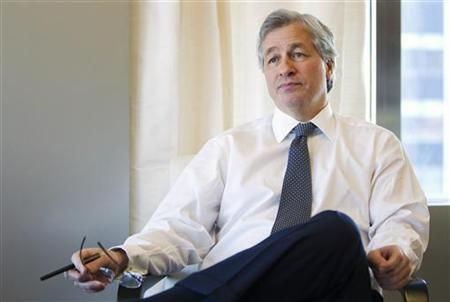JPMorgan Chief Jamie Dimon Is Sitting Pretty Despite Fallout From 'London Whale' Scandal

Despite all the rigmarole about the risky trading by JPMorgan Chase & Co. (NYSE:JPM) that led to a $6.2 billion trading loss last year, what will save Jamie Dimon from any major career repercussion is the fact that if you own stock in JPMorgan, you’ve made money under the chairman and chief executive's leadership. And above all the din and arguments concerning risky banking practices is the voice of money -- if you’re making it, then you’re fine with how it's being made.
For better or for worse, America's largest bank has seen record profits under Dimon. Its stock has risen by more than 20 percent in the past six months. The bank’s board and major shareholders are largely satisfied with their boss. Even the bank’s staunch political critics, including Sen. Elizabeth Warren (D-Mass.), seem to like Dimon. Sure, he might have been forced to give up half of his $23 million compensation last year, but the guy has a lot of allies even if he’s become a symbol, in some people's eyes, of Wall Street hubris and arrogance -- which was further helped along by Dimon dismissing analyst Mike Mayo’s question last month by quipping: “That’s why I’m richer than you.”
But for Dimon, there is a downside to Friday’s hearing by the Senate’s Permanent Subcommittee on Investigations, which summoned to Washington current and former JPMorgan officials, including the bank’s ex- Chief Investment Officer (CIO) Ina Drew, who was ultimately blamed for the so-called “London Whale” trading scandal that came to light in May 2012 and who was forced to resign.
A subcommittee report last week accused JPMorgan of, among other improprieties, tinkering with the bank's own risk-assessment model to mask the high level of risk in its Synthetic Credit Portfolio (SCP), a complex security used to speculate or hedge that an obligation will not be paid, and then hiding the extent of the losses from shareholders for weeks after Dimon and others realized the extend of the losses. Furthermore, some of the funds the bank used were federally insured deposits, underscoring an issue government regulators have with a bank using taxpayer-backed funds to engage in high-risk hedges.
The Senate subcommittee hearing is keeping in the spotlight the trading scandal that emerged publicly in May 2012 right as lawmakers are drawing up important banking regulations, some of which Dimon and other banking leaders oppose. Secondly, it’s giving cause to call to break Dimon’s position into two, so that he is no longer both chairman and chief executive officer, according to a DealBook report posted late Sunday.
New York City Comptroller John C. Liu, who handles $500 million worth of stock in JPMorgan on behalf of local pension funds, told Dealbook that Friday’s hearing shows that “senior executives not only misinformed investors and regulators about the excessive risks the bank was taking, but also withheld this information from their own board.” Liu is part of a group of shareholders calling to break up the CEO and chairman roles into two positions. Many companies do this and it is considered a positive by institutional investors who see the roles' consolidation under one executive to be poor corporate governance that gives too much power to one person.
For its part the Senate subcommittee report is calling for an immediate implementation of the Volcker Rule, the section of the Dodd–Frank Wall Street Reform and Consumer Protection Act that would bar banks from using its equity in proprietary trading for its own benefit (rather than on behalf of clients) and from owning a hedge fund. It would also limit the liabilities a bank can hold.
During Friday’s five-hour hearing, Sen. Carl Levin (D-Mich.), who chairs the subcommittee, didn’t mince words about the bank’s trading activities, saying it exposed “a derivative trading culture at JPMorgan that piled on risk, that hid losses, that disregarded risk limits, that manipulated risk models, that dodged oversight and that misinformed the public."
In her first public comments on the issue, CIO Drew blamed subordinates for not fully divulging the mounting losses linked to betting against Europe’s sovereign debt, stopping short of naming names, including trader Bruno Michel Iksil, who was nicknamed the London Whale for his outsize trading strategies and who was the first executive directly linked to the trading debacle.
If you missed Friday’s hearing, watch it here.
© Copyright IBTimes 2024. All rights reserved.





















